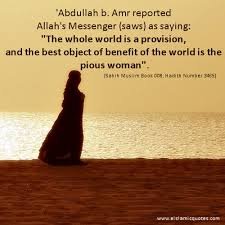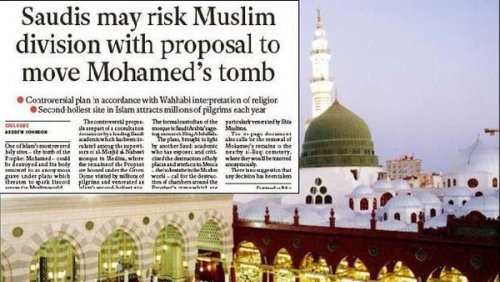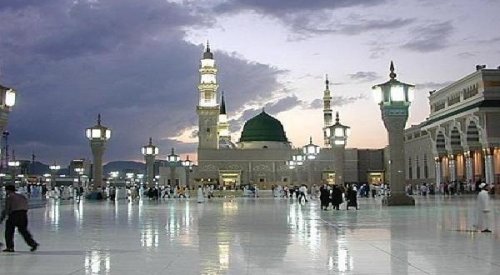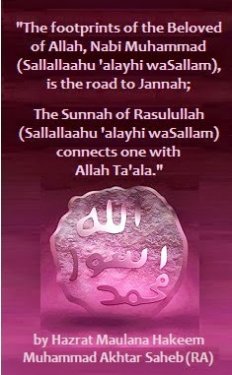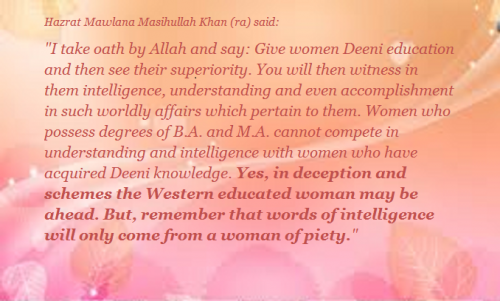-
Posts
8,434 -
Joined
-
Days Won
771
Content Type
Profiles
Forums
Events
Everything posted by ummtaalib
-
Question and Answer: Q. What should we do with the musical instruments? Some years ago I played the guitar, then I learned that music is forbidden. What should I do with this musical instrument - to sell it and give this money to charity or simply throw it away? What can I do with audio recordings of music - throw them or I can sell them and give the money to charity? (Query published as received) A. You should break it and throw it away. You cannot sell it or give to another person as this will result in encouraging the person to use the Haraam instrument. (al-Musu’ah al-Fiqhiyyah al-Kuwaitiyyah, Vol: 37, Pg: 108) The same applies to the audio recordings of music. You should destroy and discard them. And Allah Knows Best Mufti Suhail Tarmahomed Fatwa Department Jamiatul Ulama (KZN) Council of Muslim Theologians
-
Of Tombs, Discord, and Manufactured Journalism The Reality Behind the Independent Article on the Prophet’s Grave By Hasib Noor Yet another article about the destruction of the Prophet's grave is published and I catch the story early as it's released. Wincing at the title of the article in the Independent, the UK national daily newspaper”…Muslim division… proposal… Mohamed's tomb,” I think to myself as I'm reading, “oh no, not again.” Social media is absolutely livid. I'm getting tags, messages, and posts directed at me as everyone is inquiring about what is going on. Why me? Living and studying in the City of the Prophet Muhammad is a mix of having a guilty conscience wrapped in a blessing. We constantly question ourselves. We constantly say it's not something we ever deserved. But it's a blessing we have to constantly be thankful for and live up to the legacy of this city. There is a tradition that's been passed down among the students to remind us of living up to that legacy, something age old. It's been narrated by each generation of Madinah students to the next. The saying goes: “don't ever think you were so special to deserve to come here, but know that you needed this the most.” Everything about being here reminds us of the responsibility. We are studying the faith that two billion people hold dear, in a tradition of over 1400 years, in the same location that the most beloved person to these two billion taught it in… the city of Madinah, one of the holiest cities in all of Islam. The Prophet's masjid— Al-masjid Al-Nabawi —the world's oldest Islamic institution is the legacy of all of Islamic civilizations, scholarship, and history. All of it traces back to what every single Muslim shares and holds dear about this city. Not only because the masjid serves as the world's oldest Islamic learning institution, but because Muslims know the exact location where the beloved Prophet Muhammad is buried. Madinah is where I read the article published by the Independent. I feel sick. The language itself is loaded, divisive, intended to make an impact. And the reaction is the same. All of us feel it, think it, say it. “This CAN'T be true.” I immediately send messages to my friends and contacts that are researchers at the Center for Historical Studies and Research of Madinah – to verify the news. My friend and long time researcher Abdullah Kabir Al-Shanqiti responds right away. He had already heard about the article. Many of the researchers, as well as the British-educated director of the center whom I know well, speak English. We have a conversation to discuss the details of the article and it is conclusive. Standards of Journalism Divisively worded to bring about an intended response, almost all of the facts in the article are not only out of context, but embellished or completely untrue. The article is laced with references to sectarian differences, and even manages to fit in a mention of ISIS for effect. The source mentioned in the article, Dr. Irfan Al-Alawi, of the Islamic Heritage Research Foundation, represents a polarizing organization called the Center of Islamic Pluralism based out of Washington D.C. The background, connection, and history of the organization and Dr. Irfan Al-Alawi is deserving of an entire separate article. The timing of this article was something that came to light as research was done by close friends that showed that the Independent regularly posted articles every year that seemingly recycled the same story regarding the destruction of masjid Nabwi, Mecca and/or the Prophet's tomb. These articles date as far back as least to 2011. Dr. Alawi is consistently used as a source annually on this topic in 2011, 2012, 2013 and now with the most recent one in 2014. One can recognize a clear trend or what some might call agenda. Focusing on the facts of the latest Independent article, the article was pure tabloid—not journalism and certainly not news. Written not with intent to share an event, but a planned disposition for an intended effect. Worse, it seems entirely premeditated. Who is Dr Al-Shabal? The entire story plays off the words “proposal” and “plans.” Emphasizing the veneration of this site by all Muslims, Shia and Sunni, of all backgrounds to create a crisis —a strategic divisive effect. The reality is, there was no such proposal, and there were no plans. The article discussed a 61-page document by a “leading Islamic academic Dr Ali ibn AbdulAziz al-Shabal.” The reality is he is not a leading academic, unheard of by the Center of Historical Studies, and someone unknown until the Independent coined him as a “leading Islamic academic” figure. The document he wrote was a paper that post-doctoral candidates in Saudi Arabian universities write in order to reach the level of adjunct professor. Al-Shabal teaches at imam University. He submitted this paper to the Committee of the Presidency of the Two Masjids in order to establish credibility and at the end of his paper he made suggestions. He did not submit a proposal to the government; that was never intended—let alone accepted. It was an entry submitted to an academic journal that was taken completely out of context in the Independent article—no, not out of context, seemingly used for an intended purpose. The writer of the Independent article makes claim that Dr. Al-Shabal “calls for the destruction of chambers around the Prophet's grave ” and “the removal of Mohamed's remains to the nearby al-Baqi cemetery, where they would be interred anonymously.” A prominent and well known scholar and professor in Umm al Qurra University in Mecca, Saudi Arabia, from the lineage of the Prophet , Dr. Hatim Al-Awni Al-Sharif calls this a lie and the article a fabrication. He says that Dr. Al-Shabal in fact called for the “separation” of the grave from the masjid structure and not destruction of the tomb or removal and relocation of the grave. While correcting this fact, he scathingly critiques Dr.Al-Shabal's academic journal submission and called it “against the tradition of scholarship from the time of the companions and scholars of this ummah.”He further says while the Independent article stands corrected, “this does not change the fact that [Al-Shabal] went beyond all bounds… and the problem that exists with some is that they believe that they are more knowledgeable and stand more for (the defense of) monotheism than the entire Muslim nation, otherwise they would never have the audacity to put forth such a preposterous opinion!” Dr Al-Sharif concludes that the academic paper went against the tradition and understanding of orthodoxy entirely and that even though the Independent was completely wrong, lied, and falsified what Dr. Al-Shabal wrote, it still is something that's rejected. Furthermore, Dr. Al-Shabal was painted as a “leading islamic academic figure,” yet he does not represent any kind of scholarly decision-making body, such as the Council of Senior Scholars whom the government directly seeks approval from. Nor does he represent the Organization of the Islamic Council, a 500-member body comprised of scholars from all over the world that's based in Jeddah. Nor does he sit in the Fiqh Council (alMajma' al Fiqhi) another international council that has members such as renowned scholar Sh Abdullah ibn Bayyah, and holds its meetings in Mecca. This single fact shows how little the Independent even knows about how scholarly bodies are petitioned when it comes to matters dealing with Islam's holiest sites. Flashback to last year—the Council of Scholars in Saudi Arabia oversaw the decision to expand the Prophet 's masjid. An official government proposal and plan was given to them for approval. The expansion of the masjid in this proposal required changing the place of where the imam leads prayers in the original masjid. For over 1000 years Imams have led prayer here. This proposal suggested—for the first time in Muslim history—that the imam would deliver sermons on a minbar other than the pulpit of the Prophet . The Council unanimously rejected the proposal with the exception of only two members who gave secondary suggestions. The King called for a readjustment of the expansion to demolish all of the 5 star hotels in the back of the Prophet masjid and expand in a direction that preserves the original building, pulpit, and prayer cove. I had to ask. How could the Council of Scholars, made up of at least one Madinan scholar, my own teacher, Sh. Muhammad Al-Mukhtar Al-Shanqiti, reject a plan and proposal to not have the pulpit of the Prophet moved, yet they listened to a plan for his tomb to be moved? It was something impossible. A Divisive Strategy to Sow Seeds of Discord The problem of manufactured journalism is something we've seen more rampant today. A former CNN reporter, Amber Lyon, exposed that some news outlets even get paid by governments. Regardless, seeds of discord spread among Muslims throughout social media because of the pervasive and almost subliminal impact such media plays. Many went in deep hate mode and lunged full on attacks.. without checking the facts. When the facts were pointed out to many that the article contains false information, most seem to not care, “the reality is we can't forget that Saudi did…” or “but in Saudi…” type rhetoric spread. Even academics that lay claim to scholastic standard, even journalists, even educators… many fell prey to the exact intention of the article —the sowing of discord. For many equating Saudi to not just a government but to an ideology that pigeonhole others became comfortable, again. The “they” and “us” is something that spread through the discussions on social media, no matter which “spectrum” the person belonged to. The standing and representing movements rather than Islam again reared its ugly head. Many let their feelings dictate their rationale—it didn't matter if the assertions in the article are false, there is injustice that needs to be spoken against, and criticism that needs to be made. Destruction and Preservation in the Haramain We must admit. We must be truthful. The realities of history, the truth of demolishing many archaeological sites, historical locations, and other damages to the two holiest sites in Islam is something that is concrete, recorded, and undeniable. There is no doubt, a time, a place, and a discourse that must be had on the destruction of historical sites (I plan on writing a critical analysis of the destruction and preservation of historical sites in the Haramain). However, many do not know about the existence and the work of the organizations to preserve historical sites. In fact, the Center for Historical Studies and Research of Madinah has an entire division that oversees preservation of archaeological sites in Madinah, makes recommendations to the government body overseeing expansion, and I have personally witnessed the director signing 18 sites to be preserved in the future expansion of the Prophet 's masjid. Another organization that does the same in Mecca is called the Al-Furqan Islamic Heritage Foundation, and many other organizations exist both in Mecca and Madinah that work to preserve historical and archaeological sites as best as they can. But what must be realized, what must resonate, is that there is no doubt that this strategy of manufactured journalism to sow discord is prevalent and strategically placed. Muslims cannot afford to fall prey to this. Muslims cannot accept to give up the ethos of our faith in verifying news, not spreading everything we hear, and lose sight of the brotherhood that unifies us to collectively speak out against injustice, oppression, and transgression in our faith. Muslims cannot fall into emboldening sentiments of partisanship and hatred that these type of articles wish for. Right now a correction of false information that's spread, an understanding of our history, our heritage, our tradition, and our knowledge must be sought. It is in these turbulent times that we clearly see the work of strategy in play, and it is in these times that we beseech our teachers, our scholars, our academics, our journalists, our educators, all Muslims to hold fast and not let distraction seep in. Not let the seeds of discord blur our vision. Not let the disagreements distance ourselves from the objective of reaching a mutual understanding. Holding tight to the same rope, the unity of Muslims, a mutual understanding, a strength must be kept. Holding on to the Legacy of Madinah After my preliminary responses on Twitter, I had the opportunity to have an exchange with prominent British journalist Mehdi Hasan. The disagreement over the facts wasn't there. It was a deeper sentiment that the article targeted and wished to sow. We had a calm exchange, where we laid out our points. I pointed out the factual inaccuracy and emphasized that. And the exchange ended cheerfully with me offering him a cup of tea on his next visit to the holy city of Madinah and a discussion we can have—person to person. He happily obliged and said he was looking forward to it. And I responded; I assured him the Legacy of Madinah is alive and well and will continue to be. This legacy will always defeat those who wish the seeds of discord. The legacy of the Prophet that is ingrained in our faith to overcome and realize the bigger picture, know and understand not just the time to discuss disagreements but the place and environment as well, and to see through the elements that wish to sow that discord in our ranks. This is the type of discourse we should encourage to have with one another, this is the type of legacy that we should preserve. In trying times where there are major events occurring in the world, our priorities should be directed by that legacy. A legacy that informs us, that the honor, blood, and sanctity of a Muslim is holier than the Ka'aba itself (1). A legacy that tells us, “It is enough of a lie to relate to others everything you hear (2).” A legacy that guides us, “O you who have believed, if there comes to you an immoral person with information, investigate, lest you harm a people out of ignorance and become, over what you have done, regretful (3).” Let's uphold to that legacy, and not allow our discourse to be set by divisive elements and let discord sow in our hearts and ranks. These are from the hadiths of the beloved, our Prophet Muhammad and guidance from the Qur'an. That is the legacy we must carry. That legacy lives on… and will continue to live on. Hasib Noor, completing his final year in Bachelors at the College of Islamic Law in the University of Madinah, following undergraduate study in the US majoring Pre-Med & minor in Psychology. FOOTNOTES: 1. A hadith narrated in Tirmidhi, Ibn Majah, & Ibn Hibban- by Abdullah ibn Amr who said “I saw the Messenger of Allah circumambulating the Ka'bah and saying: 'How beautiful are you and how good your fragrance; how great are you and how great your sanctity. By the One in Whose Hand is the soul of Muhammad, the sanctity of the believer is greater before Allah than your sanctity, his blood and his wealth, and to think anything but good of him.'” 2. A hadith narrated in Sahih Muslim by Abu Hurayrah 3. Qur'an 49:6 muslim matters
-
by Fatima Asmal Rehana looked up from her cup of tea, and shook her head disapprovingly. “How do I look, Azhar?” Tasneem, her 20-year-old daughter was asking her brother, as she made her way to the breakfast table. “Fat,” giggled 14-year-old Azhar, returning to his plate of sausages and eggs. “Fat is exactly what you are going to be, if you keep stuffing your face like that,” Tasneem retorted, admiring herself in the Defy oven. Clad in her tightest pair of fitted blue jeans, beige clogs, and a transparent white cropped top, which barely covered her chest, let alone her tummy, Rehana thought her daughter looked… “Disgusting.” She bit back her anger and tried to sound calm. Tasneem shot her mother a furious look. “Who asked YOU? Why can’t you just leave me alone?” “Tasneem, you make it seem as if I’m picking on you. But I’m not. At the end of the day my advice is only for your own -” “Yes, yes, for my own good – save the speech for someone else Mummy. As you might have noticed, it was lost on me yesterday and the day before and the day before, so just put a lid on it now will you?” Rehana shook her head again, at a loss for words. She looked in her husband’s direction, pleadingly. But he sat at the table, cup of coffee in one hand, newspaper in the other, engrossed in the sports pages. Perhaps he’s pretending, she thought. Like me he’s probably fed up with the endless arguments. “I’ll be late, have evening lectures, so don’t ring me twenty thousand times, nagging me.” Her daughter’s angry voice interrupted her thoughts. “Oh, so you aren’t going to eat now?” Rehana suddenly noticed that Tasneem was slinging her campus bag over her shoulder, and making her way to the door. She motioned at her to sit down. “No thanks – I’ve lost my appetite.” “Gooood Fatty’s lost her appetite, she’ll get thinner now, and there’ll be more food for me…” Azhar sang, as he grabbed Tasneem’s plate. “Shut up you little brat.” “Tasneem.” Thankfully, this time, Iqbal did intervene. “Don’t be rude to your brother, he’s just joking. And listen to your mother and sit down. Unless of course you want your car to be taken away from you for a while.” “Okay, okay, I hear you.” Tasneem grudgingly put her bag down, and pulled a chair opposite her mother. Rehana smiled at her daughter. “I don’t mean to push you into doing anything you don’t want to do Tasneem. I’m not asking you to cover your face or anything like that. In fact, lately I haven’t even asked you to cover your hair. With the way you’ve been dressing lately, I’d be happy if you just wore longer tops and looser trousers.” Tasneem sighed. “Look Mummy, we only live once. You had your fun – I’m not stupid. The whole family knows you and Daddy met at campus – and don’t tell me you were covering your hair then. So after having your fun, it’s very easy for you to sit back and preach to me.” Tasneem, you are right, I only started covering my hair after you were born. And yes, I wasn’t a perfect Muslimah at campus – but don’t you see? I regret every minute of it, and that’s why I tried to encourage you to fear Allah from a tender age.” “Fear of Allah is in the heart Mum. And you can’t judge what’s in my heart.” Rehana nodded. “But at the same time, we have to project our fear of Allah on the outside too, Tasneem. And there’s a good reason we are instructed to dress modestly. Believe me Tasneem, you do want a boy to marry you for your inner beauty not for your body.” Tasneem laughed heartily. “Mummmm, relax. I don’t have a boyfriend, and the last thing I’m thinking of right now is marriage. I just want to have fun, okay? Love you…See you later.” And with a frivolous peck on Rehana’s cheek, she was gone. Rehana put her cup of tea down. Once again her daughter had totally missed the point. Iqbal smiled at her encouragingly. “At least you tried, Ray.” He shook his head sadly. “I gave up ages ago.” “Oh, I won’t give up. We shouldn’t ever give up.” ******************************************** “Tazzzzz – wow girlfriend, you look fantastic…” Aaliyah greeted Tasneem at the top of her voice, as they made their way to the campus cafeteria. Tasneem giggled with delight. “Awww thanks. You look pretty cool yourself,” she said examining her friend’s new hairdo. “Yeah, you two look great. I stayed up all night, studying for the Ecos test, no time to dress up this morning. I feel quite left out,” moaned Ayesha, rummaging through her bag, frantically searching for her mobile phone, which was bleeping away, signalling the arrival of a host of SMS-es. “Ooooo Tazzz, look there’s Osama, checking you out again,” Aaliyah shrieked as they seated themselves at a table. “Aaliyah don’t!” Tasneem rolled her eyes up in disgust. “Hello? Am I missing something here? What are you two on about?” Ayesha tugged at Tasneem’s top. Tasneem motioned in the direction of the table alongside theirs’. A heavily-bearded student, clad in a crisp white kurtaa, sat there, his face buried in a book. “Is his name really Osama?” Ayesha asked. “No silly…Aaliyah just calls him that, cos he’s always dressed in that garb and doing the Jumu’ah khutbahs.” “Really?” Ayesha asked, interested. “So what does he talk about?” “Oooo looks like you have competition Taz. Hands off Ayesh. He wants Taz.” “Come on guys, I’m serious. What does he talk about?” Aaliyah cleared her throat and waved her hand up in the air dramatically. “The temporary nature of this life…the frivolity and deception of youth…blah blah blah.” “Okay, I’m definitely not interested. Hey Tasneem, is he really into you? Did he like ask you out or something?” “No way. Look at him, does he look the type?” “Lower your voices,” Ayesha said. “I’m sure he can hear us.” “Who cares if he does? Serves him right if he does -giving us Muslims a bad name, dressing like that, and always looking at the ground when he’s walking, as if his head is paralysed or something,” Tasneem replied, deliberately craning her neck and raising her voice. For a fleeting moment, ‘Osama’ did look up, but he quickly returned to his book. Aaliyah sniggered. “Well said Taz…Maybe you should be giving the Jumu’ah khutbahs.” “Hey there’s someone who would look right at home, giving a Jumu’ah khutbah,” laughed Tasneem, revelling in their daily early morning session of juicy gossip. She pointed in the direction of the entrance, where a pretty girl, clad in a long-sleeved dress, and a neatly-tied scarf, was standing. “Who is that Daadi-ma?” laughed Aaliyah. “Come on girls, you’re just jealous, she’s actually very pretty,” said Ayesha. This time ‘Osama’ definitely heard them. He looked up at the entrance and waved, a smile lighting up his serious expression. “Apaa, over here,” he called. “What a strange name – ‘Apaa’.” “Tazz. It’s not her name. It’s Urdu for ‘Big sister,'” Ayesha explained. “Oh.” Tasneem’s voice reflected her disappointment. “His sister? And here I was thinking that maybe he wasn’t such a goody-goody after all.” She looked at her watch, and hurriedly stood up, detangling her bag from the back of the chair. She grabbed Aaliyah’s arm. “Come on., .we’d better make it for the English lecture now, if we want to catch an afternoon movie.” “Yeah, okay.” Aaliyah followed her out of the cafeteria. “What did you tell your Mum anyway?” Tasneem grinned. “What else? The usual – evening lectures.” ******************************************** Tasneem looked up at the sky, as she reversed out of the parking bay, It was a typically beautiful Durban day – ideal for the beach. Perhaps she should ring Aaliyah and Ayesha and tell them to meet her at Addington instead she thought, as she made her way out of the campus parking lot. “Nah, I don’t have my costume any way…” she said to herself. “Besides we’ve all been dying to watch this movie since it came out.” She turned on the radio, and smiled in delight as she recognised the familiar tune of Britney Spear’s latest hit, ‘Toxic’ She didn’t see him coming. There was a wave of white in front of her and a female screaming in the background as she slammed her foot on the breaks. It was too late. “God, no,” Tasneem gasped, barely remembering to turn off the radio as she dragged herself out of the car. “Osama!” She was hysterical now, screaming incoherently and crying as she noticed the blood fast forming a puddle under him. “What have I done? No, no, no.” His sister was on the phone, trying to get medical assistance, her hand clutching her brother’s. “It’s my brother Sohail. We are on the main road outside Block B.” Tasneem had seen someone die before. But looking at Sohail’s face, she realized that the death of that man, writhing and foaming after a drug overdose outside the night-club was very different to what she was witnessing now, Sohail’s face was serene, and he was smiling up at the sky. “Sohail, I’m so s-orry,” she stammered. The smile didn’t leave his face. “Love Allah Sister,” he said, in that same gentle tone which marked his khutbahs. And then without their assistance, he recited the Kalimah three times, and closed his eyes. Tasneem looked up at his sister, afraid. “I’m so sorry,” she said. “It wasn’t your fault, sister.” The tears finally came. “Sohail was in a rush to get to the mosque for ‘Asr, and he really wasn’t looking where he was going. I tried to pull him back, but-” She was sobbing now. “It’s the Will of Allah Subhanuhu wa Ta’ala you know sister, but he was my little brother, and we were close.” Tasneem shuddered as she thought of podgy little Azhar, and what she would do if someone knocked him down. One thing was for sure – the last thing she would be saying was that it was ‘the Will of Allah Subhanuhu wa Ta’ala.’ With a sick feeling in her stomach she recalled her nasty words of that very morning – to her mother, to Azhar…and worst of all – in the cafeteria: “…giving us Muslims a bad name, dressing like that, and always looking at the ground when he’s walking, as if his head is paralysed or something…” “I’m so sorry Sohail,” she whispered again. Suddenly she felt naked. She made an attempt at pulling her flimsy top down towards her stomach, but failed miserably. Sohail’s sister, still crying, reached into her bag, and handed her a long black cardigan. The sounds of sirens approaching, Tasneem wore it hurriedly, her fingers quivering as she did the buttons. She felt empty inside – I am giving them a bad name, she thought – Mummy and Daddy and Azhar, and Sohail and his sister…and Islam.. .I am giving them a bad name… ******************************************** Rehana stroked her daughter’s hair, in an attempt to soothe her. It was well past midnight, but Tasneem lay on her bed, her eyes wide open, still visibly shaken from the events of the day. Iqbal came into the room, with a mug of hot chocolate. He kissed Tasneem on the forehead as he handed the mug to Rehana. “I think you should sleep with her tonight,” he said. “Is she okay?” Rehana nodded. “She’s going to be just fine.” As she put her daughter off to sleep, Rehana thought of the many events which had shaped her own character, and she remembered with certainty that not all of them were pleasant and happy events. Yet it was these very events which had brought her to where she was today: to wearing the hijab, to enrolling for the Islamic studies course, to Allah.. .to Allah… May Allah Bless that little boy, she thought. In a day, in one sentence, he had managed, effortlessly, to succeed where she and Iqbal had not. ******************************************** hat evening, when Tasneem had appeared at the door, clutching the arm of a policewoman, her body wrapped in a cardigan, a scarf tied tightly around her neck, she had uttered the words which made Rehana realize the mistake she and Iqbal had been making, which made her remember how she had hated learning Qur’an as a little girl, because her madrasah teacher would hit her if she didn’t know her sabaq “Mummy, mummy, I’m so sorry,” Tasneem had been hysterical. Holding on to Rehana, she had sobbed into her shoulder. “Mummy, I killed a Muslim boy. But it was beautiful. I was scared. But he told me something before he died Mummy, something nobody had ever said to me before. He said – he said, “Love Allah Sister.” Source: Haq Islam
-

Ihraam Q's & A's - Method & What Is Allowed Or Disallowed
ummtaalib replied to ummtaalib's topic in Hajj/Umrah
Q: Is it permissible to use soap or shampoo in Ihraam? A: It is impermissible for one in the state of ihram to use shampoo or perfumed or scented soap. If a person used shampoo or perfumed or scented soap once or twice then sadaqah becomes waajib on him. If he uses it many times then damm becomes waajib. و لو غسل رأسه أو يده بأشنان فيه الطيب ، فإن كان من رآه سماه أشنانا فعليه صدقة إلا أن يغسل مرارا فدم ( غنية الناسك ص 249) (انظر أيضا: معلم الحجاج ص 231) ( وغسل رأسه ولحيته بخطمي ) لأنه طيب أو يقتل الهوام بخلاف صابون (الدر المختار) قال العلامة الشامي: قوله ( بخلاف صابون ) في جنايات الفتح لو غسل بالصابون والحرض لا رواية فيه وقالوا لا شيء فيه لأنه ليس بطيب ولا يقتل اه ومقتضى التعليل عدم وجوب الدم والصدقة اتفاقا ولذا قال في الظهيرية وأجمعوا أنه لا شيء عليه اه ومثله في البحر وكذا في القهستاني عن شرح الطحاوي فافهم (شامي 2/489) Answered by: Mufti Zakaria Makada Checked & Approved: Mufti Ebrahim Salejee (Isipingo Beach) -
Two Points of Neglect During Ḥajj by Shaykh Mawlānā Muhammad Saleem Dhorat ḥafiẓahullāh It is saddening to see that we spend thousands of pounds to fulfil this important obligation, yet we become negligent with regards to certain important commands of Allah Subhaanahu wata 'ala, consequently becoming deprived of the spirituality of Hajj and adversely polluting our hearts with sin, rather than enriching them with the spiritual vibes of Hajj. Read More..... Part 1 two_points_of_neglect.pdf Part 2 two_points_of_neglect_02.pdf
-
ISESCO denounces British journalist’s false allegations about a study to move Prophet’s tomb Rabat 03/09/2014 The Islamic Educational, Scientific and Cultural Organization (ISESCO) roundly condemned untrue allegations published by Andrew Johnson in the British newspaper The Independent, in which he says that the Saudi authorities are considering a presumed proposal formulated in a consultation document by a local academic suggesting to move the tomb of Prophet Muhammad (PBUH) to al-Baqi’ cemetery. ISESCO refuted the allegations as unfounded, deeming them a spiteful plot to malign Islam and Muslims and distort the image of the Kingdom of Saudi Arabia, which has always been the trusted custodian and guardian of the Muslim world’s holy sites and architectural heritage, and shown full sensitivity and commitment to the needs of pilgrims and visitors from all around the world. “This is a malicious slander meant to foment further unrest and plunge the Muslim world into irreversibly destructive strife, as part of a vast plot by criminal Zionism and colonialism to exacerbate the deadly sectarian divide and terrorism plaguing the whole region,” ISESCO went on. ISESCO also called on Muslims everywhere to reject such vicious and erroneous claims, stressing that the Prophet’s tomb is and will always remain intact. It also invited Saudi Arabian authorities to sue both the journalist and the newspaper for publishing such unverified material and hideous propaganda. Source
-
The British newspaper article had reported that the tomb of the Prophet Mohammad in the holy city of Madinah could be “destroyed” and the Prophet’s remains removed. (Photo: The Independent). Saudi Arabia rebuffs British media reports on ‘plans to destroy’ Prophet’s tomb 4 September 2014 Riyadh/Mumbai: The Saudi Arabian authorities Wednesday denied any plan to move or destroy the Prophet’s Tomb adjacent to the Masjid al-Nabawi in Madinah al-Munawwerah, and termed the news reports being circulated in the media as false, fabricated and misleading. Putting a question mark over the publication of the news report – first carried by a British daily, and then followed blindly by many media houses especially those in India, a Saudi daily has accused ‘The Independent’ of ‘news theft, and ‘mistranslation’ of its report carried on the issue on August 25. “There is no question of moving, destroying or making any change in the present status of the Prophet’s Tomb”, a top Saudi official is quoted as saying by the local media. He also rebuffed the said reports as misleading, fabricated and totally false. “This is something which we cannot even dream of doing. The report is baseless”, he said. Meanwhile, Mowafaq al-Nowaysar, the Deputy Editor-in-Chief of Saudi newspaper The Makkah accused the Independent of “theft,” claiming they have “robbed” one of their journalists of his efforts. In an editorial on Wednesday, Nowaysar said the Independent “fell in the trap of misunderstandings after it mistranslated” an Arabic article that was posted in Makkah Newspaper on Aug 25. On Monday the British newspaper reported that the tomb of the Prophet Mohammad in the holy city of Madinah could be “destroyed” and the Prophet’s remains removed to an anonymous grave. The article states that there are calls for the Prophet’s tomb to be “isolated,” not destroyed, explained Nowaysar. He also accused The Independent of previously stealing content from his newspaper. The Independent is claiming the story as an exclusive, and many media outlets around the world carried the report having credited the paper as breaking the story. Following the publication of the report in Bangladeshi media, Ahle Sunnat Wal Jamaat, a religion-based organisation, has announced to lay siege to the Saudi Embassy in Dhaka on Sunday. Speaking to Al Arabiya News on Wednesday, Omar al-Mudhwahi, the Saudi journalist who wrote the Makkah newspaper report said: “If they insist on stealing my work, at least they should allow me to provide them with an accurate translation … I would be glad to”. “I had initially written about the proposal after reading a study by Saudi academic Dr. Ali bin Abdulaziz al-Shabal in a publication published on behalf of the General Presidency of the Two Holy mosques.” In response to the allegations of “theft,” Deputy Managing Editor at the Independent, Will Gore, told Al Arabiya News on Wednesday they were “not aware of Makkah’s report” a week earlier. “The information for our article was brought to our attention by the Saudi academic Dr. Irfan al-Alawi, who had read directly the work of Dr. Ali bin Abdulaziz al-Shabal and was concerned by its content. This follows on from previous Independent articles over recent years about the approach of the Saudi authorities to historical sites in Makkah and Madinah,” Gore said. The news has also hit headlines in the Indian Urdu dailies with quotes from Saudi Arabian authorities who denied the report as baseless. The Urdu dailies also criticised the Indian media houses of carrying the Independent report with verification. “The Indian English dailies not only carried The Independent report without the needed verification but they also deleted some paras in the report that contradicted claims made by in the UK daily’s report”, a Mumbai based Urdu daily said. Source
-
The Reward of Haj There are several deeds which Rasulullah Sallallahu Alayhi wa Sallam has equated to the reward of Haj. Those who are not undertaking the Haj journey, may reap the reward of Haj by virtue of the following deeds: 1. Wudhu at home before attending Congregational Salaah: Rasulullah Sallallahu Alayhi wa Sallam has stated: “One who purifies himself (makes Wudhu) and leaves his home to attend the Fardh Salaah in congregation, receives the reward of a Haji in the state of Ihram, and if he leaves for the Salaatud-Dhuhaa (Chaast), he gets the reward of Umrah.” (Abu Dawud) 2. Salaatul Ishraaq: Rasulullah Sallallahu Alayhi wa Sallam has stated: “Whoever offers his Fajr Salaah in congregation, and then remains seated making the Zikr of Allah until (approximately 15 mins after) sunrise after which he offers two Rakaats of Salaah (Ishraaq), will receive the reward of one complete Haj and one complete Umrah.” (Sunan Tirmidhi) 3. Going to the Masjid to acquire Knowledge: Rasulullah Sallallahu Alayhi wa Sallam has stated: “Whoever goes to the Masjid for the purpose of learning or teaching Knowledge, receives the reward of a Haji whose Haj was perfect.” (Tabarani) 4. Serving one's parents: Sayyiduna Anas Radhiyallahu Anhu reports that a man came to Rasulullah Sallallahu Alayhi wa Sallam and said: “I wish to participate in Jihad, but I cannot afford it.” Rasulullah Sallallahu Alayhi wa Sallam enquired if any of his parents were alive, to which he replied, “Yes! My mother is alive.” Rasulullah Sallallahu Alayhi wa Sallam said: “Show Allah how you serve her. If you do so you will be like a Haji, a Mu'tamir (one performing Umrah) and a Mujaahid.” (Targheeb) Note: The promises of “Reward of Haj” are restricted to the reward only. It does not mean that the compulsory Haj will be fulfilled by these deeds. (Sharh-Nawawi) Masjid Poster downloadable here. Jamiatul Ulama (KZN) Council of Muslim Theologians 223 Alpine Road, Overport, Durban
- 1 reply
-
- 1
-

-
-
-
1) Patience: “And Allah loves as-Sâbirun (the patient).” (Surah Imran 3:146) 2) Justice and Dealing with Equity: “O ye who believe! Be steadfast witnesses for Allah in equity, and let not hatred of any people seduce you that ye deal not justly. Deal justly, that is nearer to your duty. Observe your duty to Allah. Lo! Allah is informed of what ye do.” (Surah Maeda 5:8) "For Allah loves those who are fair (and just)." [surah Al Hujurat 49:9] 3) Putting Trust in Allah: “Certainly, Allah loves those who put their trust (in Him).” (Surah Imran 3:159) 4) Kindness: Ayesha (رضي الله عنها) narrated: The Messenger of Allah ( صَلَّى اللَّهُ عَلَيْهِ وَسَلَّمَ) said: “Allah loves kindness in all matters.” (Bukhari) 5) Repentance: “Truly, Allah loves those who turn unto him in repentance.” (Surah Baqarah 2:222) 6) Piety: “Verily, then Allah loves those who are al-Muttaqun (the pious).” (Surah Imran 3:76) "For Allah loves the righteous (the pious)." [surah Al Tawbah 9:4] Reported by Sa`d bin Abu Waqqas (رضي الله عنه :): Messenger of Allah ( صَلَّى اللَّهُ عَلَيْهِ وَسَلَّمَ ) said, "Allah loves a slave who is pious, free of all wants and the unnoticed.'' 7) Good-doing: “Truly, Allah loves Al-Muhsinun (the good-doers).” (Surah Baqarah 2:195) 8) Purification: “And Allah loves those who make themselves clean and pure.” (Surah Tawbah 9:108) 9) Humility of the Rich: Sa’d Ibn Abi Waqqas (رضي الله عنه ) said: Allah’s Messenger ( صَلَّى اللَّهُ عَلَيْهِ وَسَلَّمَ ) said: “Allah loves the believer who is pious and rich, but does not show off.” (Muslim) 10) Magnanimity: Al-Hakim narrated: The Messenger of Allah ( صَلَّى اللَّهُ عَلَيْهِ وَسَلَّمَ ) said: “ Allah is All-Generous and He loves generosity in sale, purchase and judgment.” 11) Virtuosity: The Messenger of Allah ( صَلَّى اللَّهُ عَلَيْهِ وَسَلَّمَ)said: “Allah loves the believer who is poor but virtuous enough to refrain from begging though he has many children.” (Muslim and Ahmed) 12) Love for the Sake of Allah: Al-Tabarâni, Ibn Ya’lâ, Ibn Hibban and Al-Hakim narrated: Allah’s Messenger ( صَلَّى اللَّهُ عَلَيْهِ وَسَلَّمَ) said: “If two individuals love each other for the sake of Allah, the stronger in love to his brother will be more loved by Allah.” 13) Continuous Performance of Righteous Deeds: Allah’s Messenger ( صَلَّى اللَّهُ عَلَيْهِ وَسَلَّمَ) said: “The best loved deeds to Allah are the ones that are continuous even if they are not very many.” (Bukhari and Muslim) 14) Sabr (Patience): "And Allah Loves those who are firm and steadfast (As-Sabirin (the patient))." [surah Ali 'Imran 3:146] 15) Praying Salaah on time: “The thing that Allah loves most is when his people pray salaah on time.” (Hadith- Bukhari) 16) Good Manners and Conduct: Al-Tirmidhi narrated: Allah’s Messenger ( صَلَّى اللَّهُ عَلَيْهِ وَسَلَّمَ) said: “The best loved by me and the nearest to me on the seats on the Day of Resurrection are those who have the best manners and conduct amongst you, who are intimate, are on good terms with others and are humble, and the most hated by me and who will be on the furthest seats from me are those who are talkative and arrogant.” Love of Allah is the basis of worship that should be directed to Him alone. Any other love should be for his sake too. The real love of Allah is to do whatever He ordained and to abandon whatever He forbade, in addition to Following Rasulullah ( صَلَّى اللَّهُ عَلَيْهِ وَسَلَّمَ)’s Sunnah. Whoever obeys someone or something other than Allah and His Messenger ( صَلَّى اللَّهُ عَلَيْهِ وَسَلَّمَ), or follows any saying other than theirs, or fears other than Allah or seeks the pleasure of other than Allah, or puts his trust in other than Him, does not love Allah, nor does he love His Messenger ( صَلَّى اللَّهُ عَلَيْهِ وَسَلَّمَ). Muslims should also love one another and wish the best for one another. Allah’s Messenger ( صَلَّى اللَّهُ عَلَيْهِ وَسَلَّمَ) said: “One will not be a true believer unless he loves for his brother what be loves for himself.” (Bukhari) islaaminfo
- 1 reply
-
- 1
-











